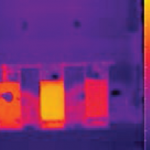|
Defects
|
Probable causes for the defect
|
Design for Maintainability (DfM) Guidelines
|
Frozen / unable to trip
 Thermal image of an overheated circuit breaker Corroded circuit breaker (CB)
|
- Damaged by dirt, corrosion or mishandling.
- Contacts are burnt if they are loosely fitted.
- Improper design rating or wrong installation – should be tested.Fuse of wrong rating or non-calibrated CB –usually from careless maintenance GFCI-deformed or missing pins, damaged insulation, incorrect wiring.
- Interlock is worn with time or key missing for mechanical type. As a result CBs can’t function properly.
|
Design
- Comply with the requirements of electrical installations as per BS 7671:2008+A3:2015, SS CP 5:1998, NFPA 70 [5]; including the location and number of power points.
- Ensure switchboards have adequate space and access for operation and maintenance.
- Specify suitable switch closets with regard to moisture exposure conditions.
- Refer to the definition of types and functionality of RCCBs and specifications for RCBOs as per SS 480:2016 (IEC 61009-1:2010+AMD1:2012+AMD2:2013 CSV BS EN 61009-2-1:1995).
- Provide sub-metering system with remote measurement capability and link to BMS/EMS to track energy consumption data trends [6].
Construction
- Conform to the guidelines for construction and compliance inspection of electrical connections and earthing thereof (BS 1363-4:2016, SS 403:2013).
- Refer to BS 8512:2008 for storage, handling and installation of power cables on wooden drums.
- Install sub-metering system with remote measurement capability and link to BMS/EMS to track energy consumption data trends [6].
- All accessible metal parts of connection units should be in electrical contact with the earthing terminal(s) (BS 1363-4:2016, SS 403:2013).
Maintenance
- Conform to the maintenance of electrical installations as per BS 6423:2014, BS 6626:2010, SS 538: 2008, [3;7].
- Check for insulation damages (e.g. cracks, blisters, warping) caused by overheating, physical impact or by spillage of cleaning chemicals.
- Check for potential short circuits or ground faults. Ensure that switchboards are not exposed to direct sunlight or alternative heat sources.
- Conduct annual shutdown to eradicate hot spots along the distribution network as witnessed by the owner and certified by a Licensed Electrical Worker (LEW).
- Provide necessary warning notices/labels at switchboards (e.g. shock hazard warnings).
|
| Noisy contactor |
- Poor contact in control circuit.
- Low voltage causes chatter – rating mismatch with supply.
|
References
[1]
Normative References/Standards Referred to for Air Handling Unit and Fan Coil Unit
